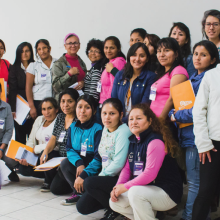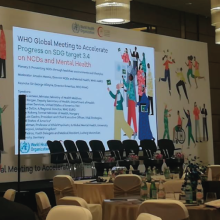For decades, mental health has been a blind spot in public health systems. In low- and middle-income countries such as Peru, only 3 out of every 100 people with depression receive treatment, largely because there are not enough specialized professionals, warns the World Health Organization (WHO).
What is being done to change this reality? In July, WHO and UNICEF, in academic partnership with George Washington University, launched the Fundamental Support Skills (FHS) Training Manual that seeks to equip doctors, nurses, social workers and other community actors with simple but essential tools to provide safe and effective support when interacting with service users.
The document is part of EQUIP, an initiative of the three entities mentioned above, which proposes a new competency-based approach: teaching specific skills - such as active listening, empathy or conveying hope - and assessing them in practice, not just in theoretical exams. It is a flexible, evidence-based method, applicable in different contexts.
“EQUIP is many things, but above all it is a response to the absence of standards that guarantee safe, quality mental health care. It is a paradigm shift,” says Dr. Gloria Pedersen, director of Mental Health and Psychosocial Support at Partners In Health (PIH), a researcher at Harvard Medical School and one of the project leaders.
Peru was a key part of that change. Thanks to the work of Socios En Salud (SES), the methodology was field-tested before and during the pandemic, and validated even at its most critical moments, with remarkable results. What began as a local experience is now part of a global manual called to transform the way the world approaches mental health.

Socios En Salud implementó la iniciativa de EQUIP a través de su manual de Pensamiento Saludable (PENSA), una intervención del programa de Salud Mental dirigido a mujeres con depresión perinatal.
Foto de Julio López / SES
How did EQUIP come about and how does it work?
In the early 2000s, a simple but powerful idea gained momentum in mental health: sharing clinical tasks with non-specialized staff, known as task sharing. Driven by WHO and various universities, this approach spread in countries with fewer resources, bringing support to communities with few professionals.
The challenge, however, was how to ensure that those providing psychosocial support offered a safe, quality service. Dr. Pedersen recalls that, outside of the medical or psychological field, there was no clear way to assess those competencies.
With that need in mind, EQUIP was born, a digital platform that seeks to deepen mental health care and psychosocial support. “We designed a tool that allows us to measure skills, integrate them into training and supervision, and promote a competency-based approach beyond simple knowledge tests,” he explains.
Through simulations, direct observation and feedback, EQUIP teaches and evaluates key skills by prioritizing how they are applied in practice, not just in theory. And therein lies its difference: it’s not just a checklist, but a training philosophy.
EQUIP thus fills a crucial gap, offering a standard that is as valid for psychiatrists and psychologists as it is for community workers. Its inspiration came from Dr. Brandon Kohrt and colleagues at TPO Nepal, with their experience in developing the ENACT tool, which WHO adopted as the basis for EQUIP.
“The main challenge, as is often the case, was funding, in which USAID was key,” Dr. Pedersen notes. “Another was adapting the tools to multiple cultural and linguistic contexts, as we worked with more than seven countries on rigorous research to ensure that they were valid and useful in different realities.”
This is where Partners In Health comes in.

Bajo el enfoque de compartir tareas, el equipo de SES capacitó a agentes comunitarias para que puedan brindar apoyo psicosocial en sus comunidades.
Foto de Julio López / SES
The Role of Socios En Salud in EQUIP’s Global Success
Before the pandemic, talking about mental health in Peru was difficult. “There was a very strong stigma,” recalls Carmen Contreras, head of SES’s Mental Health (SAME) program. In rural areas, nearly half of women and more than a third of men feared they would be judged if they sought psychological help, limiting access to services.
In this scenario, it was surprising that Peru was chosen as one of the countries in South America to implement EQUIP. The experience was carried out through the Pensando Saludable (PENSA) project, led by SAME and targeting women with perinatal depression north of Lima. It was the first time that a global tool of this type had been tested in Peruvian communities.
“In addition to training, EQUIP allowed us to evaluate the entire process of the intervention, which was still under construction,” Contreras explains. “For me, it was an opportunity to position SES as a reference in the skills that every mental health professional should have, beyond traditional technical or academic training.”

Susana Gamboa fue una de las agentes comunitarias de salud de SES que realizó acompañamiento a mujeres con depresión perinatal como parte del proyecto PENSA.
Foto de SES
From Dr. Pedersen’s perspective, SES was decisive. “They adapted the tools to the Peruvian and Spanish contexts, and even co-developed specific instruments for the PENSA intervention,” she says. That flexibility made it possible to integrate learning in a practical way into community health services.
The effort took on special relevance with the arrival of the pandemic. Faced with restrictions and confinement, SES innovated in mental health intervention with chatbotsand remote methods to accompany the community through specialized and non-specialized mental health professionals (community health agents), while maintaining supervision. These digital solutions ensured the continuity of psychosocial accompaniment at a time when the need for support was more urgent than ever.
The scope was remarkable. In addition to validating the methodology, SES contributed to the development of the FHS, an essential part of EQUIP’s resources. Thanks to this articulation, the training also reached professionals with no previous training in mental health - nurses, obstetricians and students - broadening the project’s impact. “The impact was so great that many professionals said it was the first time they had learned how to address suicide in a practical way,” Pedersen recalls.
From Practice to Systemic Change
The FHS manual, which integrates the EQUIP model, opens an unprecedented opportunity for Socios En Salud. The organization is preparing to implement the tool in local interventions. “As always, we want to start in Carabayllo,” explains Carmen Contreras. “The idea is to demonstrate results and then present them to MINSA.”
That transition from local to national is precisely what excites Dr. Gloria Pedersen. For her, EQUIP changes the way mental health personnel are trained on the front line. “The most impactful thing was seeing nurses and obstetricians apply what they learned weeks later, especially the suicide risk screening, on their own initiative,” she says.
The reason is in the approach. It is no longer about imparting theoretical knowledge that often remains on paper, but about developing observable and practical skills. With simulations, feedback and dramatizations, professionals not only learn what to do, but also how it feels from the perspective of the user. That empathy changes the way they care.

Durante la pandemia de la COVID-19, Socios En Salud implementó respuestas virtuales en salud mental para afrontar el confinamiento y las restricciones.
Foto de SES
The next challenge is to systematically demonstrate EQUIP’s impact. “There is already evidence that it reduces harmful behaviors and empowers useful practices among providers,” Pedersen explains. “What’s missing is direct data on individual users. We want to compare, for example, two groups of nurses, one trained with competencies and one with the traditional approach, and analyze clinical outcomes.”
Although the pandemic has slowed some studies, the indications are promising. In India, patients cared for by simulation-trained professionals had better outcomes. In Nepal, a cost analysis showed that this approach is not only more effective, but does not make training more expensive. “The evidence points to competency-based training being more useful and sustainable,” Pedersen emphasizes.
Another key step is university education. “We are working to integrate these competencies into undergraduate and graduate programs,” he says. Countries such as Uganda, Sierra Leone and Rwanda are already showing encouraging progress, but there is still a need to consolidate a model that prepares future generations of professionals from the academic stage. A systemic change that Partners In Health and Socios En Salud are aiming for.




